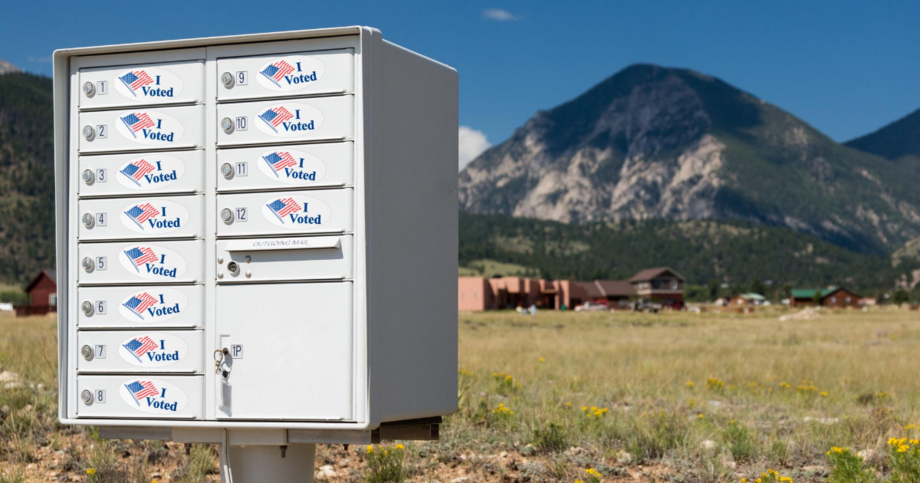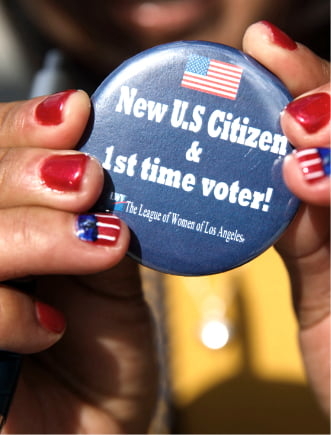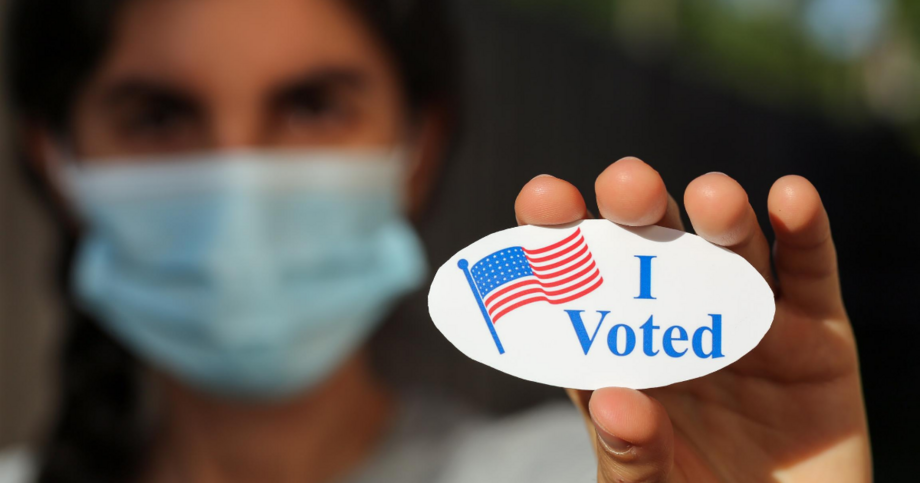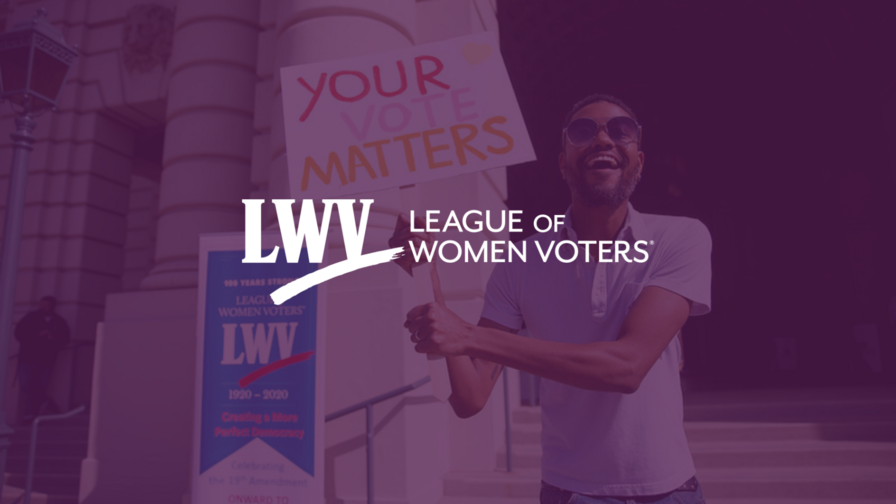Common Voting Restrictions That Are More Harmful Than You Might Think
In 2023, at least 322 bills restricting voting access were introduced in state legislatures nationwide. As states continue to make voting harder, the League and other voting rights organizations remain committed to challenging these restrictions and supporting voters. Though many of these restrictions may appear simple and easy to comply with, they often have a huge impact on voters with disabilities, people of color, indigenous communities, students, young voters, and older adults. Four common voting restrictions — third-party ballot drop-off restrictions, early voting restrictions, ballot drop-box restrictions, and strict absentee ballot requirements — are particularly devastating.
Third-Party Ballot Drop-Off Restrictions
All states offer voters some sort of mail-in ballot (usually called “absentee ballots”) for elections. Many states only allow them for “absentee voters,” while others allow any voter to vote by mail. See our section on “absentee ballot requirements” for more on general restrictions to these votes.
Stay Updated
Keep up with the League. Receive emails to your inbox!
The restriction we’ll focus on here involves limiting who may return them on behalf of voters. Some states, like Arizona, Georgia, Kentucky, Mississippi, and New Mexico, only allow the voter themself, an immediate family member, or a caregiver to return an absentee ballot, while other states restrict absentee ballots even further and only allow returns by the voter themself. While this may seem like a relatively harmless requirement, these restrictions can seriously affect the voting ability of many historically disenfranchised communities.
For Indigenous groups living on rural reservations, access to voting is severely limited by the lack of in-person polling places and ballot drop boxes. Additionally, many reservations lack physical addresses to receive traditional mail from the US Postal Service, and PO boxes are used instead. Even accessing absentee ballots delivered to these PO boxes can easily involve hours of traveling in the best of road conditions. Traveling to the closest elections office to register to vote, drop off a ballot, or vote in person can take even longer. For voters residing in the Duckwater Reservation in Nevada, for example, a trip to the nearest elections office is 140 miles each way.
Drop-off restrictions force thousands of reservation residents to either find the time to return their own ballots personally or, where allowed, designate one person to make the trip for every voter living in the community. If voters cannot return their absentee ballots, their only remaining option becomes in-person voting at polling places that are just as far away and have limited hours, making them equally inaccessible. The result is historically low voter turnout for Indigenous communities across the country.

For voters with disabilities and older adults, these requirements can be just as debilitating. Older voters may have limited access to transportation or require assistance traveling, making it more challenging to return one’s ballot. If they cannot return the ballot themselves, an immediate family member or someone meeting the definition of a caregiver would be the only individuals who could assist in returning an absentee ballot. For those without local family members, this could mean relying on nursing home staff — but even they might be reluctant to help given the criminal penalties associated with these laws, which often provide a vague definition of “caregivers” (if a definition is provided at all). And in more restrictive states, even family members and caregivers are not allowed to assist with ballot returns.
Voters with disabilities ranging from agoraphobia to weakened immune systems to mobility issues face similar obstacles in exercising their right to vote, which are only compounded by other accessibility concerns at their ballot return stations.
As a result of these laws, voting rights organizations like the League are also forced to suspend their absentee ballot assistance services in states with these restrictions. This only further limits the voting resources available to vulnerable populations that need the assistance most. In Mississippi, individuals who don’t fall into a family or caregiver exception can face up to a year in jail or a $3,000 fine for assisting voters with their absentee ballot return. Volunteers and community organizations in that state can no longer risk continuing to help vulnerable voters out of fear of being penalized, and voters who depend on those organizations are left to scramble to find other alternatives. The League is actively fighting to block these restrictions in an ongoing lawsuit, and a win would allow us to continue providing valuable voter assistance where it is needed most.

Early Voting Restrictions
Another common voting restriction passed by anti-voter legislatures is limiting early in-person voting or disallowing it entirely. Though most states now offer some form of early voting, several states provide less than one week to vote early. Mississippi, Alabama, and New Hampshire do not offer early voting at all.
Early voting has proven to be an incredibly popular and convenient option for voters, with 47.1% of registered voters voting early in the 2022 midterm election. Access to early voting is vital for voters who can't take time off work on Election Day, have children, work extra jobs, or just don’t have the capacity to vote on one specific day of the year. These are common concerns — for the 2022 general election, the most common reason cited by registered voters for not voting was being "too busy" with conflicting work or school schedules.
A lack of early voting options also disproportionately impacts Asian and Hispanic voters, who are more likely to take advantage of early voting. Additionally, studies consistently show that Election Day voting lines are longer in communities with more racial and ethnic minorities — and long lines are another deterrent from voting. Longer early voting periods would shorten Election Day wait times by spreading voter turnout over more days.
Support our work to defend voters from anti-voter legislation.
Even states that do offer longer periods of early voting often limit it to weekdays, and many exclude Sundays. Though the exclusion of one day may not immediately appear to be harmful, eliminating Sundays directly impacts movements like "Souls to the Polls" that often center voter activities around Sunday services in Black churches. In the 2020 Election, for example, Black voters in Georgia made up 36.5% of Sunday early voters despite only making up 26.8% of the early vote overall. In 2021, Georgia lawmakers attempted to eliminate Sunday voting but instead made Sunday voting optional for counties following immense backlash. In response to local election boards being given permission to eliminate Sunday voting, the League and other voting rights originations sued.
Finally, excluding weekends from early voting opportunities restricts voting opportunities for voters who work on a Monday-Friday schedule. Unsurprisingly, states that allow weekend early voting see higher participation on weekends than weekdays as voters are more easily able to make time to vote on Saturdays and Sundays.
In summary, longer early voting periods that include weekends increase voter turnout during those periods and shortened Election Day lines, a benefit to everyone.
Absentee Voting Requirements
Every state currently provides voters with an absentee mail-in voting option, a practice that allows at least some voters to request a ballot to be mailed to them before Election Day that can be returned by a designated time to a designated location. Only 35 states offer no-excuse absentee voting, which allows voters to vote absentee for any reason at all. The remaining 15 states require absentee voters to meet specific criteria, like being out of the county, having a disability, or offering proof of working a shift that spans the entirety of regular voting hours. What excuses are allowed varies by state, with some states only providing two or three excuse options.
Take Action to Support Voting Rights
When filling out an absentee ballot, voters must provide general identifying information such as their name, date of birth, and address. Some states, however, require additional information such as a copy of a photo ID, notarization, or witness requirements. While these additional hurdles may be minor inconveniences for some, they are challenging or insurmountable obstacles for many voters.
It may seem commonplace to have a driver’s license or some form of government ID, but as of the 2020 election, nearly 29 million voting-age US citizens did not have a valid driver’s license, and 7.6 million did not have any other valid form of government ID.
For Indigenous communities living on reservations, there are no state-run DMVs within reservations that can offer driver’s licenses. Obtaining a photo ID can involve traveling hundreds of miles, navigating government offices’ infrequent operating hours, obtaining birth certificates that may not exist or be invalid, and providing residential addresses that tribal communities frequently lack.

Outside of Indigenous communities, the time, travel, and documentation required to obtain a photo ID are often prohibitive for older adults, low-income communities, and voters with disabilities. These constraints have been shown to disproportionately affect younger members of historically underrepresented racial and ethnic groups, with 39% of young Hispanic voters and 37% of young Black voters aged 18-29 lacking a driver’s license (compared to only 17% of white voters of the same age).
Obtaining a witness signature or notary verification on an absentee ballot can be equally difficult. Though banks will sometimes have notaries on hand, it’s not a guarantee, and most only provide notary services to their customers during bank hours. With online banks becoming more common, many banks lack branches in different communities, and many voters may find themselves in an area with no physical banks they can go to. Finding a different, nearby notary often requires access to technology and the internet, which can confuse many voters. Even if an absentee voter can track down a notary, hours are often spotty, and obtaining their services may come with a fee. For voters with mobility and transportation issues or inflexible work hours, notarizing an absentee ballot can be a significant hurdle.
The League is fighting new absentee ballot restrictions in several states. There is ongoing litigation in Arkansas, where absentee ballots may be rejected if the ballot signature does not match the voter registration signature. This can result in valid absentee ballots being rejected simply because the signatures may appear slightly different due to the passage of time or medical conditions like arthritis and hand injuries. If an absentee voter doesn’t have the time or ability to correct a rejected ballot signature, they may lose their opportunity to vote. The League also has active litigation in Georgia, where absentee ballots must include a state ID number or a copy of a valid photo ID, and Texas, where a new law requires absentee voters to provide the number on their driver’s license or state ID.
Ballot Drop Box Restrictions
More recently, states have begun restricting access to ballot drop boxes which allow voters to return any absentee ballots directly to a drop box rather than bringing it to a polling place on Election Day or using the US Postal Service and risking a late arrival. Despite having no states report any voter fraud or interference as a result of dropbox use during the 2020 election, many states have begun rolling back access to drop boxes or eliminating them all together.
Now only 23 states offer ballot drop boxes, and many of them limit the number of boxes available. Some states additionally mandate that the boxes may only be available during regular early voting hours. Limiting drop box accessibility to early voting hours eliminates the usefulness of this option for voters who are unable to participate in early in-person voting due to conflicting work schedules. These restrictions disproportionately affect voters with disabilities and racial and ethnic minorities, who are more likely to utilize 24-hour drop boxes after business hours. And for tribal communities that lack access to reliable mail service, traveling what can be hundreds of miles to the nearest drop box location is already an immense burden made even more difficult by the business hours limitation.
For states with no drop boxes available, voters can only mail their ballots or hand deliver them to their local election office or polling place during business hours. Voters who receive or complete their mail ballots closer to Election Day and want to avoid any unforeseen delays from mail carriers may be forced to rely on the postal service because restrictions prevent them from hand-delivering their votes during the limited hours available. In the 2020 primary election, postal service delays caused some Michigan voters to receive their mail ballots just one day before the election. Without drop boxes, those voters would have had to choose between altering their work schedule and exercising their right to vote.
Ballot drop boxes make voting more accessible for people with multiple jobs and conflicting schedules, indigenous communities, rural voters, and voters in densely populated cities with longer than average Election Day lines.

The League is engaged in ongoing litigation in multiple states, including Georgia and Florida, to protect access to drop boxes. Both states introduced legislation in 2021 that limited drop box availability to normal early voting hours, eliminating the usefulness of drop boxes for many voters. The League and other voting rights organizations argue that these restrictions place a substantial burden on the right to vote and particularly impact historically disenfranchised communities.
We Need Fair and Accessible Elections
Though you may not have given much thought to these voting restrictions, it’s important to understand their consequences and continue to advocate against these suppressive tactics. Absentee voting, early voting, third-party ballot assistance, and ballot drop boxes are all safe and effective voter resources that are vital for increasing voter participation. Restricting or eliminating these options harms all of us.
To learn more about your own local voting laws and how to advocate for accessible elections in your community, check out your local League!
The Latest from the League
Today the League of Women Voters of Mississippi, Disability Rights Mississippi, and three Mississippi voters filed a federal lawsuit challenging SB 2358, newly passed legislation that significantly diminishes access to the ballot for Mississippians with disabilities. The plaintiffs are represented by Southern Poverty Law Center (SPLC), Mississippi Center for Justice, American Civil Liberties Union (ACLU), ACLU-MS and Disability Rights Mississippi (DRMS).
Voter ID laws have long been debated in the United States. While supporters argue that voter photo ID laws are necessary to prevent voter fraud and ensure the integrity of elections, reality tells a different story. Not only do these measures disproportionately impact Black, Native, elderly, and student voters, but they also fail to effectively address any real issues related to election integrity.
Sign Up For Email
Keep up with the League. Receive emails to your inbox!
Donate to support our work
to empower voters and defend democracy.





